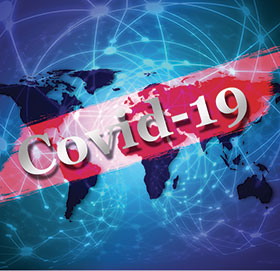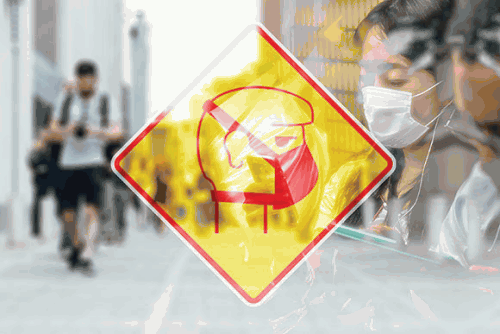

The social and personal implications of the COVID-19 Corona virus has already had a devastating impact on countries, social institutions, communities, businesses and a whole range of social and psychological events and interactions for people. It is likely to get even worse over the next few months and affect countries or areas that have been out of the mainstream of infection.
Even a few weeks ago in mid-February, I was travelling through London on crowded trains and tubes with people going to work with not a mask in sight. Contrast that with Wuhan at its worst, deserted streets in Rome, and a chapel in Italy being used for the storage of bodies. While government strategies to reduce contact through stopping of travel, advising against gatherings, and social distancing recommendations are important, concrete steps to address potential issues such as the shortage of hand sanitiser and respirators and disinfectant spraying are essential to avoid potential for the worst experiences.
For security, there a need to engage in a range of ways in order to control, facilitate and ease the transactions which are used to protect people and infrastructure from COVID-19. At the same time, the threats posed by COVID-19 have also reduced the need for security positions with cancellations of a whole range of industry activities particularly in travel and entertainment, and other events across a whole spectrum of industry and sports activity. The virus has had an impact on the fundamentals of society and security is both becoming critically important and disposable at the same time.
Security, by nature, has a function of protection. In the context of COVID-19, it has a special focus for people in a disrupted environment. Security is there to protect infrastructure, property, but also, as much as possible, the well-being and way of life of people. In this threatening environment, people need to have a sense of security, protection, and sense that they are being looked after. Security is going to have to align with these priorities to reassure people, and assist with some kind of social support, and if necessary, social control. This may be in ensuring the flow in day-to-day environments or in more threatening conditions.
If your security practices are seen to be contrary to this need for support, and people believe they could be infected by these security practices, you become part of the problem rather than the solution.
COVID-19 affects the risk profile and threats as countries, societies and individuals at all levels come under pressure and living and business strategies change. For example, gold becomes even more valuable as investors look for a safe haven, with the increased risk of even more crime targeting of gold operations. Toilet paper panic buying creates scenes of conflict in supermarkets while sanitiser becomes a sought after item and more appealing to shoplifters than razor blades and Duracell batteries.
Some places become deserted under isolation, while others need to be controlled and managed more effectively. In others, normality needs to be protected as much as possible. This may mean engaging to support and influence new norms, acceptable behaviours, well-being, access to resources and facilities, while another side may be protecting people and infrastructure in a situation of changed crime dynamics and a turbulent environment.

Insight, intelligence and communication
Being an up-to-date credible source of information and status is essential, as failures by world leaders demonstrate. We already have people facing a situation where they are being refused access to areas, facilities or treatments based on guidelines that were made a few days or a week ago that are already invalid. COVID-19 is changing things incredibly quickly and security needs to be aware of how to deal with these changes and capable of adjusting quickly. It means having access to sources of information that are credible and have known integrity. Disinformation and fake news may need to be actively addressed so people and your own actions are not compromised. Active and frequent communication, and a clear sense of leadership and direction are needed.
Social media monitoring to track trends and potential issues is potentially an important part of managing dynamics. Speak to people on the ground, including security employees, to pick up issues and find out what is happening in communities so active steps can be taken to address these concerns. Information dissemination is going to be a critical factor in success, whether in a factory, office, shopping centre or a whole country. In many cases, credible information dissemination is going to work more effectively and alleviate the need for physical force. Contact numbers and sources of information should be available and clear.
Priorities for protection
There are a variety of parties that are going to be the focus of protection. Similarly to medical staff, security personnel who are interfacing with the public also need suitable protection, particularly those in front line positions. The use of masks and/or other protective gear including head visors sends a message that the security staff themselves are serious about the issues. That is also a source of comfort to those interacting with such staff. Where security personnel are not provided with protective equipment, they are likely to seriously question how much concern the company has for them. Protection should also go beyond the protective gear, to issues of transport and getting people to work in a safe way, access to treatment if people do get ill, isolation provisions and pay.
For the people being protected, having what looks like a prepared and competent security workforce is an essential element of maintaining confidence. Assisting in generating and maintaining a culture that helps manage the threats presented by COVID-19 can be facilitated by security. This could include notifying people of behaviours that are likely to lead to contamination by the virus as part of a ‘safety culture’ emphasis.
Ironically, while people are being told not to touch their face, our research into anxiety signs during incident conditions indicate that touching areas of the face is one of the most frequent anxiety signs. As people get more anxious about COVID-19, we can expect them to engage in even more face touching behaviour to their own detriment. You may find that wearing masks and gloves makes touching behaviour more noticeable to the person, and hence more controllable. Given that criminals often engage in substantial facial touching behaviour during an incident, you may find that criminals become a group which is going to be more susceptible to contracting the virus during crime situations.
The increased stress and potential competition over scarce resources creates higher potential for conflict between people. Also, panic buying and trying to monopolise resources escalates this potential. Social regulation becomes important, even if it is a simple thing like rationing the number of items people can take, or how long they may have access to a resource. By implementing this as soon as possible, much of the dispute process can be resolved, and more equitable access to resources can be provided for.
The implications for security systems and processes
Being at the entry and exit of sites, and involving interaction and exchange with others, security in both physical and equipment form has a high potential for passing on infection. Security needs to do an intensive identification, review, and audit of unsafe practice which can cause cross infection. Biometrics, particularly fingerprint-based access has been seen as the new way of the future. Yet COVID-19 has shifted us back into the past where even simple button pushes to open booms represent a potential way of getting infected. A number of operations have already suspended fingerprint access systems and the traditional badging cards may be brought out of storage to reign again, at least until the rate of infection is minimised.
New and even traditional models for security systems are being shaken to their foundations, and plans B, C, or D should already have been implemented yesterday. Whatever security activity involves extensive contact with materials that are touched frequently by others, become a potential infection threat. This includes handing over driver’s licences to the security officer at business and residential estates being visited, given that anybody who has come in before may have been infected and potentially passed that on to the security officer.
So either there needs to be a way of accessing it that does not involve the officer touching the licence, or some kind of disinfectant agent needs to be added to the process. The same goes for breathalysers to gain access to a site or when required for driving purposes, although wiping breathalysers after use is already a more common procedure. Even the clipboards that hold traditional visitor attendance registers still represent a potential threat as does the common use of pens to sign in or out.
Control room environments and CCTV cameras are generally relatively distant from the usual interaction with the parties who work at and visit sites. Yet being a closed environment where people are in close proximity to each other and frequently touch common surfaces or objects, the control room is likely to lead to quick cross infection if just one member becomes sick with the corona virus. Procedures, cleaning, and access control rules all need to be reconsidered to minimise the potential for infection. We may find some interesting ideas coming out on remote surveillance or even surveillance from home coming out in the next few months.
Some companies have been quick to advertise cameras that can pick up people with a temperature as a tool to help detect people who may be infected. I can’t comment on the reliability of these, and at the time of writing this article, UK airports weren’t even using handheld temperature detectors because they felt they weren’t effective in detection.
Personally, I feel that while such measures may miss many people at different stages of the COVID-19 incubation and sickness periods, and may miss carriers who are not displaying signs of sickness, any kind of assistance is important and temperature screening can provide some of this. Certainly, CCTV operators and physical security personnel need to be trained to pick up the more obvious signs of people who may be affected.
Viewing Iran’s Deputy Health Minister during a recent press conference designed to say that the country has everything under control would be one useful aid to assist in detection – he later confirmed he tested positive, a symptom consistent with his feverish appearance and behaviour at the conference.
The use of CCTV to assist in contact tracing at the early stages of COVID-19 is probably largely over. Most countries have already moved into subsequent stages of delay rather than identification. However, this role may still be relevant, particularly in communities that have gone into isolation and where a person is discovered with the virus. Issues such as movement, association, areas potentially affected can all assist with management of such situations.
The crime impact
COVID-19 affects everyone in society, often in a fundamental and devastating way. Decreases in earnings, layoffs, business closures, service and food delivery issues associated with isolation, and potential access to or availability of provisions or materials are becoming widespread internationally although the extent may vary by country. Families where key breadwinners are unable to get an income may increase desperation.
Where these conditions exist they are likely to cause increases in the incidences of crime although this may vary according to the severity of the impact and support mechanisms and culture within that society. Crime dynamics could start showing up in increases to get access to goods through shoplifting, through to petty theft and increases in illegal access to properties for theft purposes. Higher value targets are likely to be affected even more.
Where more violent or organised crime already exists, it is likely that these will increase in volume. Given these conditions, security is going to become even more important.
Security always has a role and function in supporting society. The environment generated by COVID-19 is threatening, or potentially threatening, a wide number of aspects in our current way of life. Importantly, it is also threatening security practitioners and the systems we use as well.

At a personal level, handshakes have always been a part of the genuine interaction and expression of camaraderie between people in security, but we need to get used to things like ‘elbow bumps’ if we are going to keep each other well. Security as an industry will need to adapt and change, often very quickly, to deal with the challenges ahead and assist in maintaining an orderly society under difficult situations. It does mean that there are likely to be some incredibly innovative ideas coming out in the next few months. It will also involve working together and working closely with society to deal with the challenges ahead.
About Dr Craig Donald
Dr Craig Donald is a human factors specialist in security and CCTV. He is a director of Leaderware which provides instruments for the selection of CCTV operators, X-ray screeners and other security personnel in major operations around the world. He also runs CCTV Surveillance Skills and Body Language, and Advanced Surveillance Body Language courses for CCTV operators, supervisors and managers internationally, and consults on CCTV management. He can be contacted on +27 11 787 7811 or craig.donald@leaderware.com
| Email: | sales@leaderware.com |
| www: | www.leaderware.com |
| Articles: | More information and articles about Leaderware |

© Technews Publishing (Pty) Ltd. | All Rights Reserved.